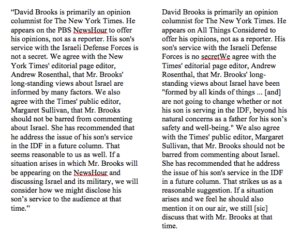PBS NewsHour Executive Producer Sara Just and NPR Standards Editor Mark Memmott seem to have come up with almost identical statements about commentator David Brooks’ conflict of interest. (Brooks, who works for the New York Times, NPR and PBS, had kept hidden the fact that his son was serving in the Israeli military while Brooks was commenting on Israel.)
Either Sara Just and Mark Memmott have been gifted with telepathy, or they – and/or their bosses – collaborated on their statements.
UPDATE, 11am Pacific time: Mark Memmott has just emailed me: “I’ve had no contact with PBS. I’ve actually never met Sara Just, as far as I remember, and have not had any email correspondence with her. I have to think that they agreed with what I wrote and decided to (mostly) reissue it.”
I find it disconcerting that PBS’s Sara Just didn’t attribute her statement to NPR’s Memmott; this seems dangerously close to plagiarism. I wonder how she learned of his statement? I’m also curious about why she removed a small but significant portion of what he had written. Please read on:
Here are the facts:
PBS Ombudsman Michael Getler reports that on Oct. 15th NewsHour Executive Producer Sara Just issued the following statement:
“David Brooks is primarily an opinion columnist for The New York Times. He appears on the PBS NewsHour to offer his opinions, not as a reporter. His son’s service with the Israeli Defense Forces is not a secret. We agree with the New York Times’ editorial page editor, Andrew Rosenthal, that Mr. Brooks’ long-standing views about Israel are informed by many factors. We also agree with the Times’ public editor, Margaret Sullivan, that Mr. Brooks should not be barred from commenting about Israel. She has recommended that he address the issue of his son’s service in the IDF in a future column. That seems reasonable to us as well. If a situation arises in which Mr. Brooks will be appearing on the NewsHour and discussing Israel and its military, we will consider how we might disclose his son’s service to the audience at that time.”
Five days before, in response to my questions about David Brooks, I had received an email from the NPR ombudsman’s office containing a statement that they said was from NPR’s standards and practices editor:
David Brooks is primarily an opinion columnist for The New York Times. He appears on All Things Considered to offer his opinions, not as a reporter. His son’s service with the Israeli Defense Forces is no secret. We agree with the Times’ editorial page editor, Andrew Rosenthal, that Mr. Brooks’ long-standing views about Israel have been “formed by all kinds of things … [and] are not going to change whether or not his son is serving in the IDF, beyond his natural concerns as a father for his son’s safety and well-being.” We also agree with the Times’ public editor, Margaret Sullivan, that Mr. Brooks should not be barred from commenting about Israel. She has recommended that he address the issue of his son’s service in the IDF in a future column. That strikes us as a reasonable suggestion. If a situation arises and we feel he should also mention it on our air, we still [sic] discuss that with Mr. Brooks at that time. [Ellipsis was in the original statement emailed to me.]
(You can see the statements side by side below.)
I published this email and a rebuttal to the statement on my blog that same day, Friday, Oct 10th. The following Wednesday, Oct. 15th, I was able to reach NPR’s standards editor, Mark Memmott, who confirmed that he had written the statement. I then raised some of the flaws I saw with it (the same ones I discussed in my post).
Memmott was particularly interested when I pointed out that the statement acknowledging Mr. Brooks’ “natural concerns as a father for his son’s safety and well-being” indicated why Mr. Brooks should recuse himself, since his commentaries have the power to influence the public in ways that would impact his son either positively or negatively.
During the phone call it came out that Memmott had not known before I called him that his statement had been sent to me. After we hung up it occurred to me that Memmott was also probably unaware that I had published it. I told him I was working on a blog post and would send it to him. I was then involved in other projects over the following days and was only able to finish my new post tonight. This contains additional info on NPR’s ethics guidelines.
After I completed it, I then looked to see if PBS’s ombudsman Michael Getler (whom I had spoken with by phone last week) had yet written anything about Brooks. I discovered his column, and was startled to see Sara Just’s statement, parts of it word for word the same as Memmott’s. The only significant difference was that the reference to Brooks’ “natural concerns as a father” section was omitted.
I now plan to contact Memmott and Just, and ask about the source of their telepathy.
While PBS and NPR are both under the Corporation for Public Broadcasting, the public perception is that they are largely independent entities with separate editorial control and decision-making. It appears that’s not the case.
Below are the two statements:

* * *
Following is information about Just and NewsHour from a press release on the PBS website:
In addition to being executive producer, Just is also Senior Vice President of NewsHour Productions LLC. She reports to Rick Schneider, President of NewsHour Productions LLC and Chief Operating Officer of WETA.
The press release states:
“In July 2014, WETA assumed management and control for PBS NewsHour, with the formation of NewsHour Productions LLC, a wholly-owned subsidiary of WETA. This transition followed the retirements of the program’s original founders, managing editors and co-anchors, Jim Lehrer and Robert MacNeil, who established the commitment to excellence in journalism that guides PBS NewsHour to this day.”



